Jerome
Hill
Artist
Fellows
2025–2028
Learn more about the program, or see Fellows in the 2023–2025, 2021–2023, or 2019–2021 cohorts.
Dance
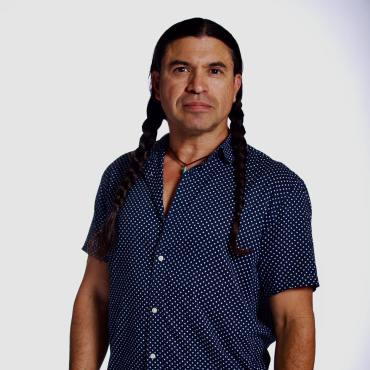

Sam Aros-Mitchell (he, him, his) is an enrolled member of the Texas Band of Yaqui Indians. As an Indigenous art-maker and scholar, Aros-Mitchell’s work spans the disciplines of choreography, performance, sound/light/scenic design, and embodied writing. Aros- Mitchell holds a Ph.D. in Drama and Theater from the joint doctoral program at UC San Diego/UC Irvine, an MFA in Dance Theatre from UC San Diego, and a BFA from UC Santa Barbara. Since 2017,he has worked with Rosy Simas Danse (RSD) as a performer, teacher, and community engagement organizer. He has performed with RSD in Skins (2018), Weave (2019), Simas short film, yödoishëndahgwa’geh (2021), and she lives on the road to war (2022-2024). Aros-Mitchell is currently collaborating with Dante Puleio, Director of Limón Dance in New York City by restaging/reconstructing two original Limón pieces, the Indio solo from Danzas Mexicanas (1939) and “the Deer solo” from The Unsung (1970). This marks a new passage for Aros-Mitchell and for Limón Dance, in sharing the proud lineage of Yaqui ancestry. Aros-Mitchell is a 2023 McKnight Dance Fellow.
Fellowship Statement
As a Jerome Fellow, I aim to expand my interdisciplinary practice, rooted in Indigenous cosmologies, to create immersive, contemporary performances that resonate with both ancestral traditions and present-day experiences. With the Fellowship, I plan to develop new works that bridge movement, storytelling, and soundscapes, fostering collaboration with Native and BIPOC artists. Central to my vision is exploring the performance space as a sacred, transformative realm where cultural memory and innovation intersect. The Fellowship will support the creation of a new performance series inspired by Yaqui creation stories, incorporating experimental music and movement workshops with community participants. It will also enable me to refine my technical skills in sound and lighting design, further deepening the impact of my work. By engaging with local and national audiences, I hope to amplify Indigenous excellence in the arts, cultivating a shared space for healing, resistance, and celebration through performance.
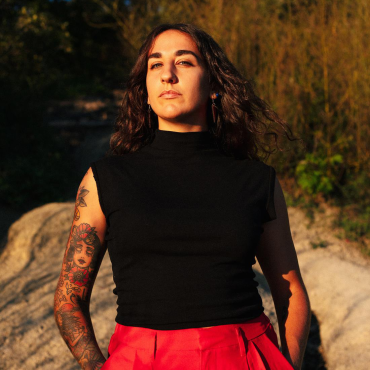

Noelle Awadallah نوال )she/her) is a Palestinian-American choreographer, dancer, improviser, and farmer residing in Mni Sota Makoce (Minneapolis). She is the Co-Artistic Director of Body Watani Dance alongside Leila Awadallah. For six years (and counting), Awadallah has also been dancing with Ananya Dance Theatre. She holds a BFA from Columbia College Chicago (2018). Awadallah’s daily pursuit of a “land-based life” emerges from sumud—a Palestinian ideology guiding steadfast perseverance and rootedness in land. Sumud drives her commitment and artistic approach to multi-directional attention, storytelling, resistance and liberation practices, grief and rage, futuristic imagination as a strategy, and tending to her reciprocal relationships with land and non-human beings. She has presented work at multiple venues such as Red Eye, University of Minnesota, MOVO, Mixed Blood Theatre, and The Southern Theater. She is the recipient of the 2020 Hinge Arts Residency, a 2023 MOVO Residency, New Works Isolated Acts through Red Eye Theater, and the 2024 Creative Individuals Grant through the Minnesota State Arts Board.
Fellowship Statement
Over the next three years, I will be in embodied research concerning the connections between Palestine and South Dakota. I am planning to research Palestinian stories of land, exile, erasure, and displacement to the stolen land I grew up on in South Dakota to where I currently reside in Mni Sota Makoce. I am questioning how these three versions of home converse in birthplace, living place, and roots of origin, while examining principles of Land Back and the Right of Return. My multidisciplinary approach includes site-specific improvisation, writing, dance, and farming explorations. This fellowship will begin my research into farming and dancing side by side, as both laborious and ancestral practices held in the container of Body Watani, with my sister and creative collaborator Leila Awadallah.
Photo by Sabrina Jasmin.
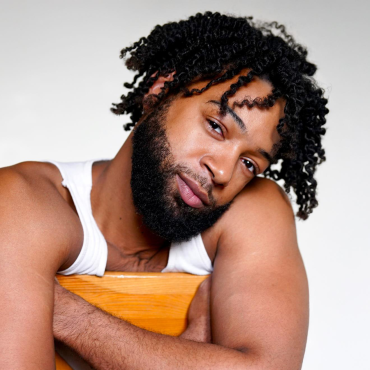

Wendell Gray II is a Brooklyn-based choreographer, dancer, and educator. Raised in Atlanta, GA, in an immersive, multidisciplinary arts environment, he studied dance, music, and theater. Since relocating to New York, Gray’s choreographic works have been showcased at venues such as Danspace Project, PAGEANT, Coffey Street Studios, Kinosaito Arts Center, Gibney Dance, and Movement Research at Judson Church, among others. Gray is a 2024-2025 Movement Research Artist-in-Residence and has additionally been supported by residency programs, including the Sightlines Dance Festival (2023), STUFFED Artist-in-Residence at Judson Church (2021), Work Up 6.0 Artist at Gibney (2020), and Chez Bushwick (2017). His artistic journey has led him to work with choreographers/ artists such as Miguel Gutierrez, Tere O’Connor, Juliana May, Joanna Kotze, Jordan Demetrius Lloyd, Pavel Zustiak, and Kevin Beasley, among others. He graduated from the University of the Arts with a BFA in Dance under the direction of Donna Faye Burchfield.
Fellowship Statement
I make dances that are episodic and rhythmic, and that juggle various performative and qualitative intentions. I look to highlight both the public nature of performance and the private essence of being human. I focus on movement, organizing it into different choreographic structures while layering this with theatrical elements such as props and texts. I find it radical to be many things at once, both absorbing and transcending my identity. I use my formal dance training as a springboard for experimentation, both poking at the western throughlines while also navigating the tropes and signifiers within it. My work asks you to listen and form curiosities, to move into the unknown, the unanswerable, and the felt. I’m in the early stages of a new group work. It is a continuation of my most previous piece in the port’s mouth which dealt with the fantasies around the unknown parts of my lineage.
Photo by Amelia Golden.
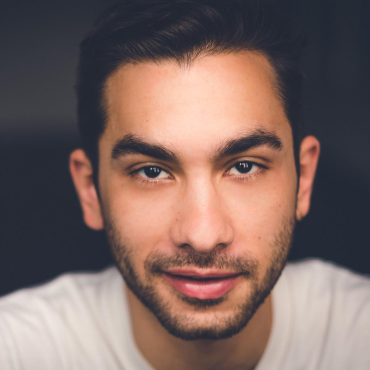

Orlando Hernández is a choreographer, tap dancer, and theater-maker based in NYC. He has presented his work at New York Live Arts, On the Boards, Joe’s Pub, Brown University, the Judson Church, and La Casa Ruth Hernández Torres. He was a 2022-23 Fresh Tracks Artist at New York Live Arts, a 2023 Artist-in-Residence at the Center for Performance Research, and has received grants and residencies from the New England Foundation for the Arts, Rhode Island State Council on the Arts, Yaddo, the CUNY Dance Initiative, the Upper Manhattan Empowerment Zone, and Snug Harbor. Hernández holds a B.A. in English from Yale University. He is a member of the tap dance and music companies Music From the Sole, Subject:Matter, and Michela Marino Lerman's Love Movement. His play La Broa’ (Broad Street) premiered in 2024 at Trinity Repertory Company.
Fellowship Statement
In my current work, tap dance conspires/collides with text, devised theater, mask-work, and live music to tell stories of metamorphosis and ecstasy. In particular I have been digging into Indigenous histories of the Caribbean from my perspective in the Puerto Rican diaspora. I strive to honor my tap dance teachers and the roots of this transformative Black American art form. I believe rhythm can be a guiding force and tool for understanding power, geography, and processes of cultural formation.
Photo by Michael Rosas.
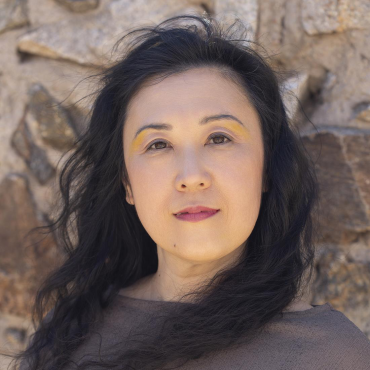

Alys Ayumi Ogura (オグラ アリス ア有美)(she/her) is a dance performance-maker, storyteller, dancer, and through her movements, voice, and quirky humor. A Twin Cities-based native of Japan, Ogura has been developing her own work since 2015. Ogura started her dancing with two mentors: the late Mika Kurosawa and Rob Scoggins, who each offered unconditional encouragement. She has worked with more than 40 artists—near and far—including Hauser Dance, Emily Johnson/Catalyst, ASDC, Emily Gastineau, Sandrine Harris, Kata Juhasz, Pam Gleason, Pramila Vasudevan, and Laurie Van Wieren. Ogura has created more than 20 works performed in various U.S. venues, including the Walker Art Center and Southern Theater. Recognition highlights include: Arts Organizing Institute (2017-18), Naked Stages (2021) Fellowships, An Isolated Act commission at the Red Eye Theater’s New Works 4 Festival (2023), and Keshet Makers Space Experience Residency (2024). Ogura is also a steering-committee member for DanceMN.
Fellowship Statement
When I develop and perform my work, I want to challenge the audience's acceptance of ambiguity by flipping the power dynamic and centering on my mother tongue, and Japanese views and values. My thematic foci and social concerns focus on my identity as an Asian woman who speaks English with a Japanese accent. I wonder how I can offer my audiences—particularly those with different cultural frameworks for navigating the world—a glimpse of my worldview. This is the question I want to continue pursuing, to provide a safer, more enjoyable, and perhaps even transformative experience for my audiences. I want to use my voice to give a platform to those who have similarly marginalized voices. Rather than appropriating others’ voices, I will be a good ally and amplify their voices through my own creative work. This is a challenging, but worthwhile endeavor I am eager to continue exploring.
Photo by Pat Berrett. Courtesy of Keshet Makers Experience Space, Albuquerque, New Mexico.
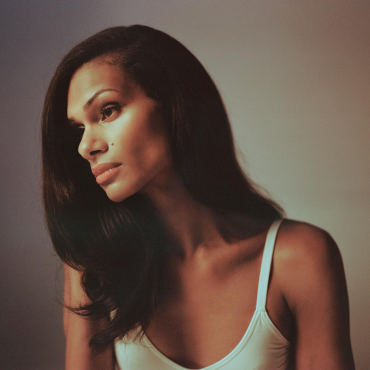

ms. z tye is a Brooklyn-based artist who is interested in physical investigations, including but not limited to movement, voice, sculpture, and theater. tye explores concepts through ancestral praise. She is intrigued with somatic relations and how they associate with emotional connectivity. She has been included in exhibitions with Bronx Museum of Arts, Volta/Armory Art Fair, Swivel Gallery, Untitled Art Fair, Cierra Britton Gallery, The Living Gallery, Long Gallery Harlem, Jenkins Johnson Gallery, Postmasters Gallery, Fridman Gallery, Art in Buildings, and Participant INC. Choreographic work has been commissioned by The Kitchen, BMW, The Shed, Danspace, Lotto Royale, MQBMBQ, BOFFO, Jack, Gibney, Movement Research, and Dance Canvas ATL.
Fellowship Statement
My work recognizes that with any act of public sharing lies precarity. In this space of vulnerability and perilousness, I hope to bring forth softness in the gaze of spectators through nostalgic imagery designed to spark dialogue and raise consciousness. Rooted in memory, my work reclaims rituals from the Pentecostal church as ceremonial acts. My reclamation rituals invite audiences to question phrases such as, “Come as you are” and, “The land of the free.” These prompts are not uplifiting for queer and trans folx like myself, which is revealed through the audience responses. My practice embraces attributes of faith, spirit, and the performance of patriotism to ritualize clarity and redemption for me and my community.
* intentional use of lowercase
Photo by Cheril Sanchez.
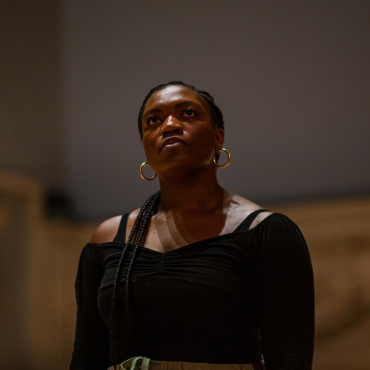

Ogemdi Ude is a dance and interdisciplinary artist and educator based in Brooklyn. Her performance work focuses on Black femme legacies and futures, grief, and memory. Her work has been presented at The Kitchen, Gibney, Harlem Stage, Danspace Project, Abrons Arts Center, BRIC, ISSUE Project Room, Recess Art, Center for Performance Research, and for BAM's DanceAfrica festival. She is a 2024/2025 BAX Artist-in-Residence. Ude has been a 2022-2024 Movement Research Artist-in-Residence, 2021 danceWEB Scholar, 2021 Laundromat Project Create Change Artist-in-Residence, and a 2019-2020 Center for Ballet and the Arts at NYU Resident Fellow. In January 2022, she appeared on the cover of Dance Magazine for their annual “25 to Watch” issue. Most recently, she has published a book, Watch Me, in a collection edited by Thomas DeFrantz and Annie-B Parson: Dance History(s): Imagination as a Form of Study published by Dancing Foxes Press and Wesleyan University Press.
Fellowship Statement
During the Fellowship I will further my investigations into Black mourning and memory through two practices. The first is an improvisation practice I call: “forgotten body.” Forgotten body asks: Can I talk back to the dead? Can I befriend grief? Can my relationships to what I have lost grow stronger in the wake of loss? Forgotten body asks you to move sensitively not sensibly, encouraging your subconscious to lead. It is built on an anticolonial approach that strengthens our connections to Black ancestry and embodied history. The second is a performance/archival project: Major. In Major, a team of Black Southern femmes embody the movement of our girlhood to answer the questions of our present. Major follows the intimate journey of returning to a body you think is lost. How can you reorganize your body to dance in the ways you were born to, but have been trained out of?
Photo by Rachel Keane.
Film
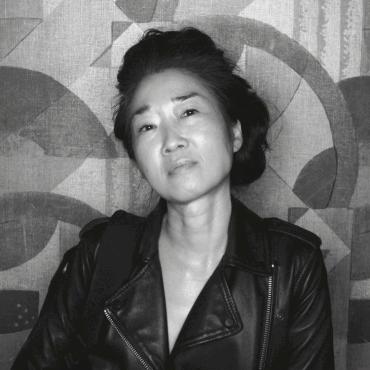

Coleen Baik is a Korean American artist and writer based in NYC. Her short films have screened at Brooklyn Academy of Music, Everyman Cinema in London, and in domestic and international festivals. Her latest film, 엄마 나라 | MOTHER LAND, premiered at Brooklyn Film Festival and is a meditation on loss through animations on a turntable. Her time in North Korea, during a 2015 peace mission now documented in the award-winning Crossings by Mu Films, was a pivotal experience that continues to influence her work through themes of absence, longing, memory, and myth. Baik shares progress from her art studio every two weeks on the-line-between.com, a Substack-featured publication. Her essays have appeared in various serials, including Roxane Gay’s The Audacity. She received a BA in French from Wellesley College; she has no formal training in filmmaking or animation. She is a member of the Korean American Artist Collective.
Fellowship Statement
I currently work in animation, painting, and prose. Visual mediums facilitate connection through ambiguity; verbal mediums do so through clarity. I’m excited to plumb these mechanics in a unified practice during the Fellowship. In storytelling, I've been interested in connecting dots between micros and macros (familial, national; individual, cultural) in the context of my various identities—as Korean, American, and cis-gender woman. I make films because, for one, I believe they make it possible to engage with a general audience, even through such a specific lens. During this Fellowship, I’ll begin working on my next animated short film. I‘m investing in tools such as a downshooter animation stand to explore new filmmaking techniques. I plan to travel for research, and hope to spark collaborations. I look forward to growing in both knowledge and craft with the help of this award.
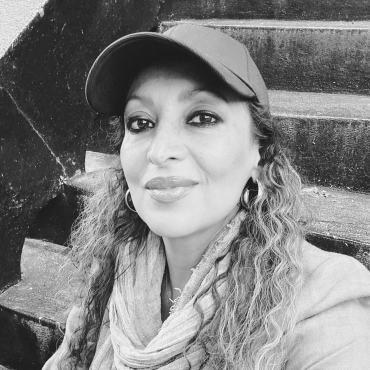

Jessica Beshir is a Mexican-Ethiopian filmmaker. She is interested in cinema that responds to an intuitive process and the forms that emerge from this journey. Her feature debut, Faya Dayi, premiered at the 2021 Sundance Film Festival and screened around the world garnering multiple awards including the Truer Than Fiction Award at the Independent Spirits (2022), the Grand Jury Prize & Fipresci Awards at Visions du Reel (2021), the Grand Jury Prize at the Full Frame Film Festival (2021), best Cinematography awards at the ASC (2022), IDA (2021), DOC NYC (2021) and was shortlisted for the Academy Awards (2022). Faya Dayi was released theatrically in North America by Janus Films, broadcast nationally on POV’s 35th season on PBS (2022) and was released in Europe and Latin America by Mubi. Jessica is a 2024 Guggenheim fellow and has been honored with grant support from the Jerome Foundation, Sundance Institute, the Doha Film Institute and NYSCA.
Fellowship Statement
As a filmmaker, I am interested in cinema that is nomadic in nature, a cinema that is liberated from the confines of genre/narrative expectations to create an aesthetic that fluidly moves amidst temporal and sonic spaces, between the physical and the spiritual worlds, invoking the mythical while grounded in socio-political concerns. I am interested in the unique cinematic forms that emerge when intuition is a guiding compass and process is trusted in the creation of stories that look and feel as free and fragmentary as Memory.
During the Fellowship, I will travel to Ethiopia to do archival research and to record oral histories of elders who lived through the Cold War. The vision is to create a poetic work whose aesthetics and thematics are rooted in the historical realities of the present to uncover past histories and the cycles of war that continue to provoke massive exiles.
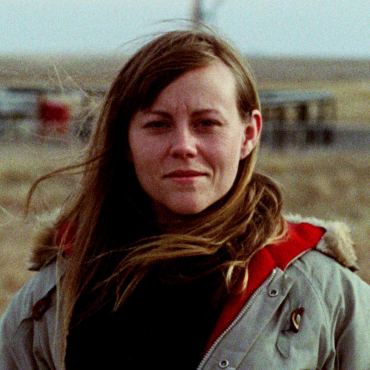

Born and raised in North Dakota and now residing in Northern Minnesota, Elizabeth Chatelain is an award-winning documentary and narrative filmmaker. Her work focuses on women's perspectives from the rural Midwest. Her documentary short My Sister Sarah won the International Documentary Association’s Award for Best Student Documentary and was a Student Academy Award Finalist. Her films have screened at festivals across the country and the world, including Interfilm Berlin and SXSW. Chatelain’s feature projects have participated in the Berlinale Script Station, the Sundance Institute’s Financing Intensive, the Blacklist/Women in Film Writer's Residency and the Stowe Story Labs. She is an Academy Nicholl Fellowship Semi-Finalist and a Showtime Tony Cox Screenplay Competition Winner. She was awarded the Natural Resources Defense Council (NRDC) Climate Storytelling Fellowship in 2024. Chatelain holds an MFA in Film and Video Production from University of Texas, Austin and an MFA in Dramatic Writing from NYU-Tisch.
Fellowship Statement
As a filmmaker born in North Dakota and residing in rural Minnesota, I am passionate about telling stories from the rural Midwest, particularly from a woman’s perspective, with nuance and sensitivity. From the effects of the oil industry in Western North Dakota to the psychological and social intricacies of Minnesota’s farming culture, it is my vision to present the stories of the north—and ultimately other underrepresented areas—to the rest of the country and the world. I am also deeply committed to engaging rural communities in all of my work, collaborating with local artists and performers. I will shoot my debut feature film, Løvset's Manoeuvre, in Hibbing, Minnesota, in collaboration with the communities of the Iron Range. My aim is to tell thought-provoking, relatable stories from these unique areas that will resonate with people everywhere.
Photo by Roshan Murthy.
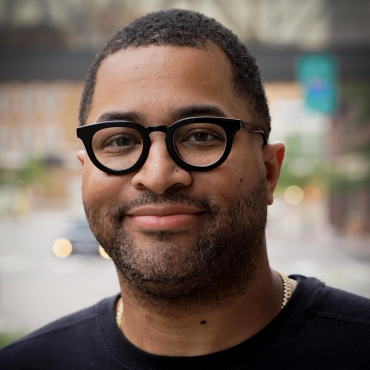

Tommy Franklin is a filmmaker, writer, producer, and creator of Weapon of Choice Podcast. He was a founding board member of All Square, is a founding board member of Ostara Initiative, and is a communications consultant at the Black Alliance for Just Immigration. His documentary You Don’t Know My Name (in production) has received support from Sundance, ITVS, Firelight Media, The Marshall Project, The Just Trust, Jerome Foundation, Jonathan Logan Family Foundation, Vital Projects Fund, and others. As of late, Franklin has developed his artistic practice during fellowships with Film Independent, CNN, Duke University Center for Documentary Studies, and others. Franklin’s one hour drama pilot Intrepid was a finalist for 2021’s Sundance Episodic Lab, and he was a 2022 Sundance BIPOC Mentorship Program Mentee. A double survivor of incarceration (born in prison and formerly incarcerated), he creatively reimagines power structures, focusing on Black liberation. He’s sure he wants to do this.
Fellowship Statement
My artistic growth requires ongoing self-reflection, as well as interrogating society and my role in it. I’m rooted in principles of creativity that come from lived experience, and I look forward to engaging and collaborating with artists who don’t run away from challenging realities we face in the world. The way formerly incarcerated people are stigmatized in society extends to the Hollywood ecosystem. We are seen as one-dimensional, “broken” with blatant character flaws and therefore not considered to be integral and valued in the storytelling process from the ground up, as if with our lived experience we aren’t the experts on the nuances within the justice-impacted universe. I spent three years in prison, locked away in five different correctional facilities. I have suffered deep pain and loss having lived through barriers connected to mass incarceration; the only journey toward healing for me is unfolding layers of truth through creative endeavors.
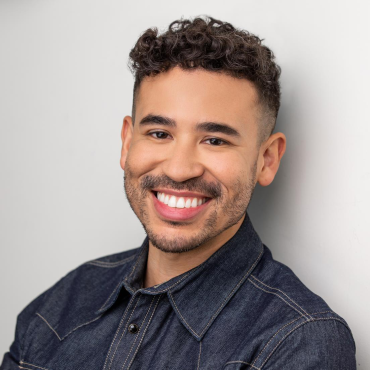

Dickie Drew Hearts is a Deaf, gay, multiracial actor and filmmaker dedicated to amplifying representation for Deaf, LGBTQ+, and BIPOC communities by showcasing American Sign Language onscreen. He recently created, wrote, directed, and co-starred in the Deaf/disabled-centric, LGBTQ+ romcom mini-series Passengers: New York City, which is now entering post-production. This series evolved from his short film Passengers, which won the 2015 Best Filmmaker award at the Easterseals Disability Film Challenge, earning him mentorship with Oscar-winning Director Peter Farrelly. In 2016, he won Project Greenlight’s LGBTQ "See Yourself" contest with his pitch Save The World, leading to a development deal with Adaptive Studios and GLAAD. Hearts also won the $20,000 Grand Prize in the 2017 AT&T Create-A-Thon for The Deaf vs The Dead, before Deaf characters first appeared on AMC’s The Walking Dead. Hearts also is a television and stage actor, and he received an Obie Award in 2024 and a Lucille Lortel nomination for The Public Theater’s Dark Disabled Stories. Hearts is the recipient of the 2021 Sundance Institute’s Uprise Grant and the 2022 Ford and Mellon Foundations Disability Futures Fellows Grant.
Fellowship Statement
I am passionate about bringing more visibility to Deaf, LGBTQ, and American Sign Language stories in scripted narratives. I believe these stories deserve to be told and am committed to creating content that entertains while highlighting Deaf and disabled experiences. With this Fellowship, I plan to produce a mini-series, with the goal of expanding it into bigger projects or having it picked up as a network TV show. I am ready to push boundaries and tell more cinematic stories that amplify disabled, queer, and BIPOC voices.
Photo by Matthew Murphy.
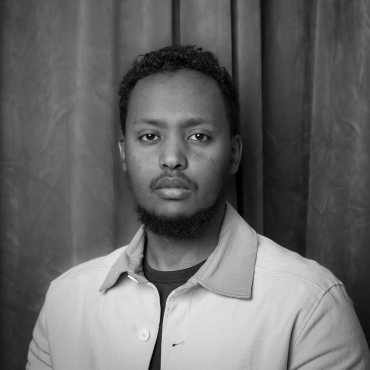

Mohammed Sheikh is a self-taught filmmaker, director, and cinematographer dedicated to capturing the unique narratives of Somalis. His filmmaking journey began unexpectedly in the Kebribeyah refugee camp in Eastern Ethiopia. There, his mother’s storytelling and audio tapes kindled a passion in him for storytelling and film. Through films like The Forgotten Ones and Balwo, he sheds light on the resilience, culture, and experiences of his community, aiming to foster understanding and preserve Somali stories. His work is a blend of authenticity and visual impact, celebrating the depth of Somali life. His short narrative films The Forgotten Ones and Luul have received recognition on platforms like CBS, Sahan Journal, and MPR News. Sheikh received a grant from the 2023 Jerome Foundation MN Film Production program.
Fellowship Statement
I aspire to tell authentic Somali stories that amplify community voices and challenge stereotypes. By adding dreamlike visuals and symbolic imagery, I want to bring fresh perspectives to my work and spark important conversations. During the Fellowship, I plan to focus on improving my craft, sharing my films at festivals, and connecting with a wider audience. I’m working to share my documentary The Forgotten Ones, which highlights the opioid crisis in the Somali community. This opportunity will allow me to dedicate myself fully to my artistic journey and make a meaningful impact through my storytelling. I’m currently working on my first feature film, Barni, about three friends searching for a missing girl in a Somali village and developing a new project about family and displacement.
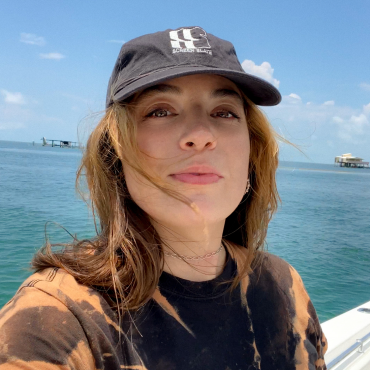

Bren Wyona is a filmmaker born in Albuquerque, New Mexico, and raised in Southern California. Through hybrid narrative and documentary media, their work explores shifting class landscapes, identity loss, and communal recovery. Wyona’s latest short film, that with which ringing is done, held above, in place—supported by Untitled Filmmaker Organization (UFO) and Zeiss—is a dynamic road trip documentary that investigates her own Diné ancestors and the Indian Child Welfare Act through the stronghold lens of Cowboy and Indian cinema. Wyona is a 2021 Flaherty Fellow, a 2021 Oolite Arts Grant Recipient, and a 2023-2025 Artist-in-Residence at the Brooklyn Academy of Music through a fellowship with the UFO Short Film Lab. They are currently in development for their first feature film, a narrative set in New Mexico and Ireland.
Fellowship Statement
I’d like to continue making films that center the unlearning of fast-gratifying plot trauma. My current projects include a short documentary featuring Indigenous drag queens, Meteorite Shepherds, a narrative about two shepherds from New Mexico and Ireland, and Camping a hybrid road trip film following a group of queer Indigenous legends living in Los Angeles. This Fellowship will be crucial in allowing me resources and time to evolve into long-form practices. As I begin to develop my first feature films, I want to ensure that these practices are in collaboration with Diné elders including group therapies, cast and crew education, and mechanical processes like film development with foraged plant materials. The industry is in dire need of intentional film sets that fight for land protection, collaborative labor, and honorable images.
Literature
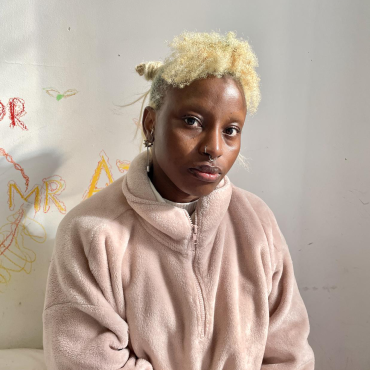

ỌLÁKÌÍTÁN ADÉỌLÁ is a writer and experiential artist working between the lyric, multimedia installation, and theatrical performance. Kìítán’s artistry is in flux with ÌSÈSE of the Yorùbá tradition and continually devoted to storytelling eros and wayward survival. He authored the interactive memoir, Whiskery Squid and the experiential art box, Perfekt Trans~. Kìítán’s work has been exhibited and published in The Museum of Modern Art, Anthology Film Archives, The Wrong Biennale, Five Myles, NY Art Book Fair, Swiss Art Awards, For Space, Brooklyn Rail, Gulf Coast Journal, amongst others, and has received support from CUE Art Foundation, Recess Art, the Toni Beauchamp Award, Lucky Risograph, and The School for Poetic Computation.
Fellowship Statement
I dwell with lived experience, poke underneath the hood of time, slice and cut things apart to unravel submerged—historical, bodily, and psychic—realities within. Survival is also laying our stories bare. I am crafting a house—a novel—honouring ancestral thrums, heat and native rhythms. For a verse novel that crawls across generations, striding through time drenched in wild love and grief, it is important to give ear and eyes abundantly to its grunts, where it breaks and desires to be stitched back with crimson and gold streaks. This Fellowship will support my time to drill more into the lyric as a form to animate history and as a poetics of being. Perhaps epics choose us. I’ve had a realtime experience of this. The lyric and I continue to have the most intricate relationship.
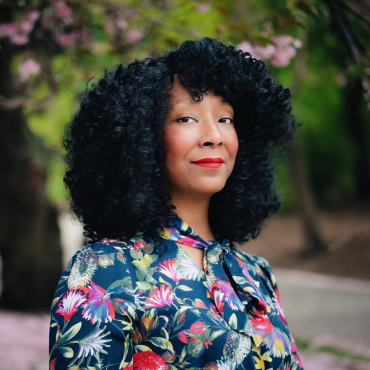

S. Erin Batiste is an interdisciplinary poet and artist. Her poetry has been published and anthologized in wildness, Interim, and New Letters as the 2023 Winner of the Patricia Cleary Miller Award for Poetry. She is a 2024 Artistic Practitioner Fellow at Brown University’s Center for the Study of Race and Ethnicity in America (CSREA). Additionally, she has received fellowships and generous support from New York Foundation for the Arts, Cave Canem, Kolaj Institute, MASS MoCA and Assets for Artists, Salzburg Summer Academy, PEN America, The Poetry Project, Poets & Writers, and Bread Loaf Writers' Conference, among other honors. Batiste runs Revival Archival Cards, Collage & Salvage—a mobile arts studio in Brooklyn. Her collages have appeared in Create! Magazine, Michigan Quarterly Review, Obsidian: Literature & Arts in the African Diaspora, Southern Cultures, and The BOOOOOOOM Care Art & Photo Book. She has exhibited at LA Zine Fest, Black Zine Fair NYC, and the Center for Afrofuturist Studies Ordinary Survival Inaugural Film Festival.
Fellowship Statement
I do Black women’s work. My poetry and collage projects center the lives and experiences of Black women, matrilineage, and ancestors. My practice is rooted in accumulation and maximalism, and I am influenced by beauty, the desert and the cosmos, migration, divination and astrology, archives, Americana, and what remains. My work examines freedom, the complexity of memory, what we consider history, and the ways we all inherit and collect possessions and stories. Much of my work relies on history as a primary source. My mother, a dark skinned daughter of Texas Juneteenth folk, was born the same week the Supreme Court ruled on Brown vs. Board of Education, and my father was a descendant from one of the original Louisiana Creole families. As a result, I inherited and carry the South with all of its blood, glory, and contradiction. I am grateful that the Fellowship will allow me to work towards my first full length poetry collection, Hoard, and to expand my experimentation and ongoing work with the archive.
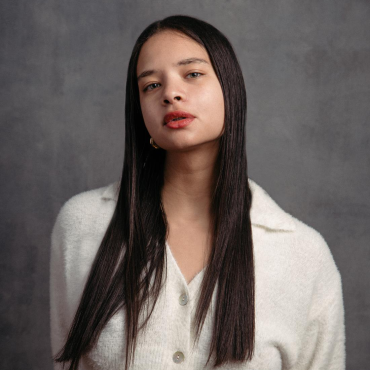

Liana Mack (she/hers) is a writer, born and raised in the Bronx, New York. Her poetry and erotica has been published in Hobart, Hunger Mountain Review, Sarka, Triangle House Review, Dream Boy Book Club, dirt child, and more. She is a former lifestyle writer at The Cut (New York Magazine) and Heroine (Grailed). Her research and writing on the plaçage system has been recognized by the Edith Wharton/Straw Dog Writer’s Residency at The Mount in Lennox, MA and Atlantic Center for the Arts in New Smyrna Beach, FL. Mack has also been supported extensively in her writing by international residencies including Arteles (Hämeenkyrö, Finland), Metropolitan Fukujusou (Kyoto, Japan), and Gullkistan (Laurgvatn, Iceland). She is of Black, Wesort, and Swedish descent. Mack has a BS in Visual Art from the School of Art + Design at Purchase College and studied writing under Elaine Kahn, Eileen Myles, and Cynthia Cruz.
Fellowship Statement
I write sexy, slippery fairytales starring the subtle magic and actual monsters that menace real life. My work warps the boundaries of arousal and disgust, hunger and gluttony, romance and obscenity. It’s escapist, but never without consequences. It’s trashy and awake. It’s rancid, lush, and shameless. The next several years will be an especially antagonistic time to be a woman writing openly about sex, power, and sickness, which makes holding the line all the more urgent. I am so beyond honored to be supported by this Fellowship as I generate new work.
Photo by Ramuel Galarza.
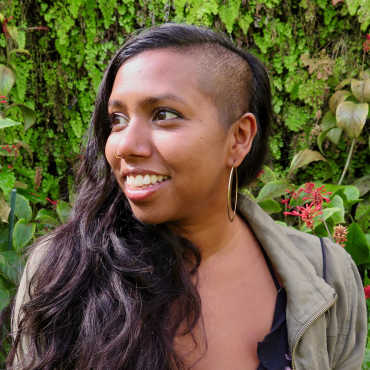

Aurora Masum-Javed is a poet and educator. A former public school teacher, she received an MFA in Poetry from Cornell. A recent Philip Roth Resident and Hub City Writer in Residence, she has received fellowships from places such as Tin House, MacDowell, Millay Arts, and others. Her work can be found in various journals, including Nimrod, Black Warrior Review, Aster(ix), Winter Tangerine, Frontier, Jaggery, and Callaloo. Masum-Javed was a 2023–24 Loft Mentor Series Fellow and 2024 Civitella Ranieri Writing Fellow. She has also received fellowships from the MacDowell Colony, the Millay Colony, Caldera Arts, Hub City, Vermont Studio. She currently resides in Minnesota where she teaches at Macalester College and is finishing her first book.
Fellowship Statement
I am drafting and redrafting my first collection of poems, which at its heart questions: What does it mean to daughter? Each poem enters the question through a different door, untangling it through a new form. I've found that every door leads to another, and that the relationship and power systems within a home often mirror those of society. Perhaps the repair work of a family can reflect something back to us about transforming society. During the Fellowship, I will work on my second book, still a seedling. This new work will be a speculative, epistolary novel in verse—involving letters between a prophetic great-grandmother and her grandchild, both living on the same commune generations apart.
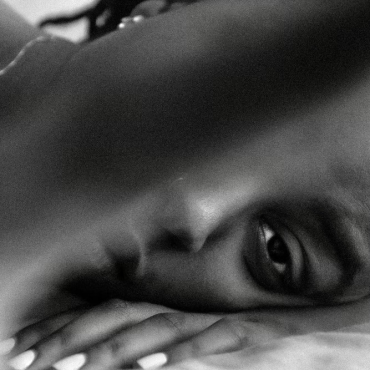

sadé powell is a concrete poet from New York City, exploring the sonic, kinesthetic, and linguistic possibilities of her 1930s Royal typewriter. Rooted in Black feminist poethics and inspired by the gritty spirit of her upbringing, she examines the dissemblant vernacularity of what is colloquially considered “the hood." Through experimental print and paper techniques, powell critiques grammar and mucks up orthography. Her work has been supported by the Whitney Independent Study Program, The Poetry Project, The Center for Book Arts, Hand Papermaking Magazine, Triple Canopy, and KOLAJ Magazine, among others. In 2023, she published chapbooks periodluv with Belladonna Collaborative and wordtomydead with Ugly Duckling Presse. Her debut collection, dontbeabitterbtch, is forthcoming with selva oscura press. She holds a BA in Cultural Anthropology from San Francisco State University and an MA in Performance Studies from NYU Tisch, and serves on the editorial collective for Women & Performance Journal.
Fellowship Statement
i approach this Fellowship as an opening—a field of possibility where i can situate the mundanity of divestment and its otherwise. my practice, rooted in concrete poetry and the generative dissemblance of illegibility, engages with themes of vernacularity and the unknown. these modes disentangle normative frameworks that demand performance and understanding, carving space for the grit and blur undergirding fugitive aesthetics. through ephemeral installations and experiments with scale, form, and papermaking, i aspire to render Black abstraction as relational and deeply social, embedding it as a ubiquitous storytelling presence across the boroughs.
* intentional use of lowercase
Photo by Chris Cuadrado.
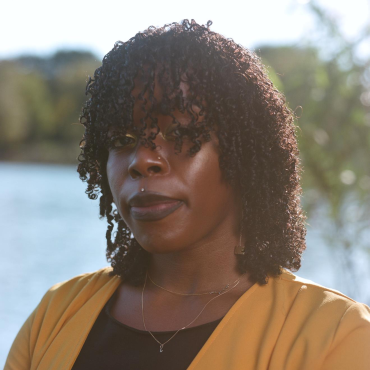

Jasmine Reid is a transatlantic poet for the people. She is the author of Interlocutor Goddess (Autumn House Press, forthcoming), winner of the 2024 Center for African American Poetry and Poetics Book Prize; and Deus Ex Nigrum (Honeysuckle Press, 2020). An MFA graduate of Cornell University and recipient of fellowships from Cave Canem and Poets House, her work has been published or is forthcoming in the Academy of American Poets’ Poem-a-Day, Kenyon Review, and Virginia Quarterly Review, among others. Reid was born and raised in Baltimore, Maryland, and is currently based in Brooklyn, New York, where she is an assistant professor at NYU.
Fellowship Statement
My primary goal for this Fellowship is to complete work on a collection of poems figured out of the tranatlantic-transgender middle passage and wound, misassigned at birth, poems that rearrange the traumatic into the life-bearing, the cut into the invaginated. In plasticity and reconstruction, from wound to womb, I conceive new, liberative passage. So enacted: a fugitive fecundity that escapes the annihilative imagination of the bourgeois state unto revolutionary path and possibility. Through research on such defiant forms, phenomena, and ideation (consider the matsutake and the astronomic “perfect black body”), and the work of poets in revolutionary struggle, I will sharpen the poems’ political vision, formal invention, and improvisation. This sharpness will righteously ooze, draw blood from reader to rehydrate the knowledge that we are inseparable from land, soil, stars, and each other. Inner space pregnant with outer space: a poetry for the people to become earthlings, again.
Photo by Nico Reano.
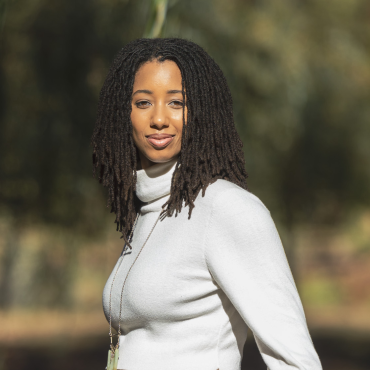

A. E. Wynter is a Black, Jamaican-descended writer, editor, and curator living in Saint Paul, MN. She has received multiple grants from the Minnesota State Arts Board and has organized various events throughout the Twin Cities, including readings, writing workshops, and multimedia art exhibits. Wynter was a fiction fellow in the 2021-2022 Loft Mentor Series and a 2023 resident at the Carolyn Moore Writers Residency. Her poems have appeared in Torch Literary Arts, West Trade Review, Water~Stone Review, and elsewhere. Wynter received The Florida Review 2024 Editors’ Award in Poetry, the 53rd New Millennium Award for Poetry, and was recently nominated for a Pushcart Prize.
Fellowship Statement
As a writer, I explore many themes: family and womanhood, home and spirituality, memory and language, ghosts and genetic inheritance, the dissonance between being Black and American. Recently, I have begun to examine these themes through the lens of the body, or rather, body translation—interrogating emotional, spiritual, and physical scars to create a conversation in which the body talks back. Is body memory our most reliable record keeper? How does a body housing fractured histories become whole? Throughout the Fellowship, I will work on in-progress poetry collections and continue to experiment with existing and (re)imagined forms, finding ways of “bodying” the poem to process personal and communal histories. The goal is to create another language in which to understand the world, the self, and the unseen.
Photo by Davide Ranieri.
Music
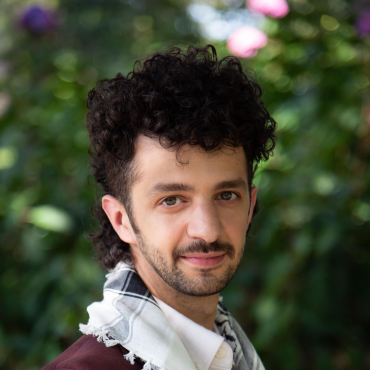

Tarek Abdelqader is a Minneapolis-based composer and musician. He has produced and performed his own work under various monikers and with myriad collaborators, and regularly supports regional and international artists and bands as a drummer. He was a 2018-19 Cedar Commissions awardee and a 2019 Metropolitan Regional Arts Council Next Step Fund recipient, which enabled him to travel throughout Palestine for research related to his debut EP, Ramallah, 8/22. Abdelqader also works as an accompanist, composer, and sound designer for dance collectives based in the Twin Cities and New York, including Ananya Dance Theater, Paula Mann, and Limón Dance Company. Most recently, he composed the score for Palestinian-American dance collective Body Watani’s After the Last Red Sky, a dance performance and ritual gathering to hold the weight of—and imagine healing for—the Palestinian sky.
Fellowship Statement
During this fellowship period, I intend to honor my existing commitment to deep instrumental practice while expanding the edges of my artistry. I will write and create with familiar Minneapolis faces and with new collaborations forged in Beirut, Lebanon. I will begin writing with the goal of a 2026 release of my debut album, which will feature many dear collaborators and friends. More concretely, I will continue my work with Body Watani dance collective on After the Last Red Sky, which will tour within the U.S.—and hopefully beyond—in 2025/26. I look forward to continuing my support of artists within and outside of my Midwest ecosystem while giving my own work the time and attention it needs to flourish.
Photo by Sharolyn B. Hagen.
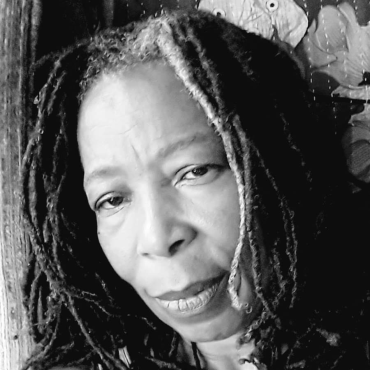

Melanie Dyer is a composer, violinist, and trans-disciplinary musician working in creative-improvised music. She is the recipient of awards including the 2024 New York Council on the Arts Support for Artists, the 2023 Herb Alpert Foundation Ragdale Prize, the 2022 Jazz Road/South Arts, and a 2022 and 2019 Chamber Music America award, among many others. Current projects include Incalculable Likelihood, an operetta for 12-piece ensemble (Vision Festival 2024), Siren Xypher Trio, and collaborations with several NY-based musicians. She convenes the improvising string/rhythm collective WeFreeStrings, Dyer has performed and recorded with the Sun Ra Arkestra under Marshall Allen; Tomeka Reid's Stringtet; and on William Parker’s projects. Her appearances include Vision Festival, Donaueschingen Musiktage, Festival Sons d’hiver, and Lincoln Center Outdoors, and many more.
Fellowship Statement
Creative risk and expanding my vocabulary as a violist, composer, and trans-disciplinary musician will feed me over the next three years. My immediate project is to expand and stage Incalculable Likelihood at Mabou Mines black box experimental theater in December 2025. Over the next two years, I envision studying approaches to composition marginally familiar to me (privately), composing for new and existing ensembles, becoming a better improviser and violist, co-producing two trio recordings, and pursuing a sound project involving mass spectrometry. I live for new ideas. The Fellowship will support plans, purposes, and pursuits that inhabit and excite me. The Fellowship also represents the tangible possibility of generating new work, and being in conversation with creative thinkers and the participating public.
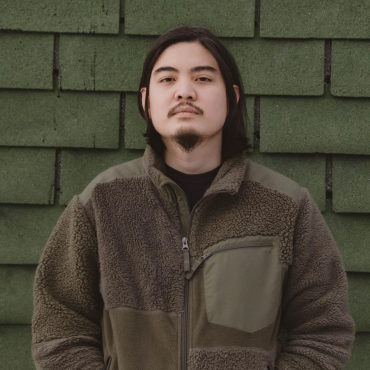

Kengchakaj Kengkarnka is a Thai diaspora, Bangkok-born, Lenapehoking-based artist, pianist, improviser, and synthesist. His practice engages with composing and improvising sounds from personal experience that draw inspiration from ancestral soundscapes, knowledge, and modes of collaboration and expression rooted in Southeast Asian tradition and lineage. His medium of expression spans acoustic piano, electronics, Southeast Asian retune analog synthesizer, multichannel spatial audio, and live coding—a practice of writing and executing code in real-time—utilizing technologies to produce a multisensory live performance. Kengkarnka is a Manhattan School of Music (MM) graduate, a Fulbright Scholarship recipient, and a Gold Award Lumen Prize winner. He is a Collider Fellow and a Y11 NEW INC member. His projects have received development funds and support from the Lincoln Center, NEW INC, Queens Council on the Arts, City Artist Corps, Rhizome, Processing Foundation, CultureHub, Babycastles, Eyebeam, and Institute for Electronic Arts. He is one-half of elekhlekha อีเหละเขละขละ, a collaborative duo with interdisciplinary media artist, Nitcha Tothong.
Fellowship Statement
With the Fellowship, I plan to travel through Southeast Asia to learn from elders, teachers, and traditional practitioners while continuing my study with Kru Amp, a Thai traditional music practitioner in the U.S. When researching Southeast Asia's diverse sound cultures, I often encounter a challenging political landscape marked by the historical silencing of sound cultures and activists’ voices. Through my work, I aspire to honor these stories and foster a deeper understanding of these critical issues, ensuring that the unheard voices of the past and present resonate in our collective future. I’m also committed to continuing the work of decolonizing my approach by unlearning and relearning through meaningful research in my artistic practice. This involves investigating recent and ancient history, actively listening, and reinterpreting wisdom, practices, and systems offered by ancestral and heritage: to hack contemporary tools, foster experimentation, and explore alternative futures rooted in care.
Photo by Nitcha Tothong (@nitchafame), courtesy of artist.
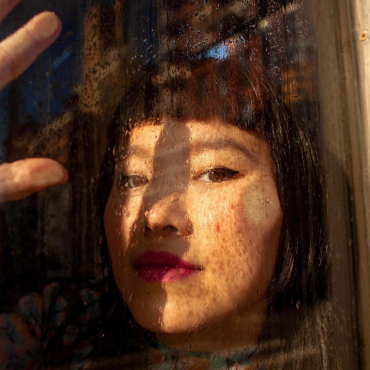

Charmaine Lee (b. 1991) is an Australian composer and vocalist based in New York City. Using the voice, feedback, and live processing, Lee’s practice is primarily concerned with risk-taking, playfulness, and improvisation. As a composer, Lee has been commissioned by leading institutions including Kronos Quartet and International Contemporary Ensemble. She is an Emergent Ventures winner (2024), an Artist-in-Residence at ISSUE Project Room (2019), and a Van Lier Fellow at Roulette (2021). Her long-standing collaborators include Conrad Tao and Ikue Mori (MacArthur Fellow). Lee frequently guest lectures on building a personal language and creative agency at undergraduate and graduate-level composition programs around the country. She serves on the Artistic Advisory Council of ISSUE Project Room and runs a record label, Kou Records, dedicated to pioneering artists in music and sound.
Fellowship Statement
During the Fellowship, I plan to hone my technical and conceptual approaches to the voice, body, and technology while exploring my use of feedback, recording techniques, and thematic ideas for film and other mediums. Inspired by Foley artists, I am developing a “cinema in sound” concept using a variety of compositional techniques to create new temporal and sonic textures. This exploration will be documented in a series of self-released projects under my new label, Kou Records. My goal is to activate a productive creative community through new relationships with artists, illustrators, engineers, and distributors. In addition, I will continue to expand my live practice, including embarking on a 50-state self-organized tour around the U.S. in the fall of 2025.
Photo by Cameron Lee Phan.
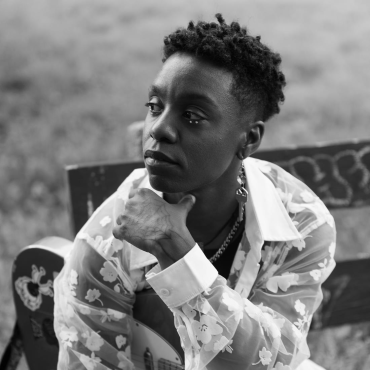

Taylor Ngiri Seaberg (they/them) is a Black, bi-polar, gender non-binary composer, multi-instrumentalist, photographer, and organizer based in South Minneapolis, Minnesota with artistic communities in Chicago and Mexico City. Born in Kusel, Germany, migrating to the southeast coast in Norfolk, Virginia, and settling with family in Minnesota, Ngiri was introduced to different music styles in their formative years. Their main love is the bass guitar. They go by the tongue-in-cheek artist moniker, “Manic Pixie Dream Boi” to highlight representation of bi-polar disorder within the Black queer community. Ngiri was awarded a Minnesota State Arts Board (MSAB) 2019 Cultural Community Partnership grant for an artist networking series called Artist Feast. They were awarded a Foundation for Contemporary Arts (FCA) grant and Red Bull Arts grant for their protest photography around the Uprising in the Twin Cities in 2020 and a 2021 Metropolitan Regional Arts Council’s Next Step Fund. They also performed in an artist residency, The Playground Experience, curated by 2021-2023 Jerome Hill Artist Fellow, Vie Boheme, in partnership with Public Functionary.
Fellowship Statement
Ngiri's work lies at the intersections of protest work (with photography and songwriting focusing on the Black experience) and breaking the mental health stigma, having been diagnosed with Bi-polar type 1 from a young age. They play bass and electric guitar, piano and flute, all of which they self-record and self-produce.
During the fellowship period, Ngiri aims to highlight the intersections of bi-polar disorder and artmaking, specifically with their self-produced (albeit slightly manic) album—a kaleidoscope of diverse beats called Manic Pixie Dream Boi, the queer tongue-in-cheek moniker that is also their artist name.
Photo by Alex Hazel.


Mary Prescott is a Thai-American interdisciplinary artist, composer, and pianist who explores the foundations and facets of identity and social conditions through experiential performance. Her output includes several large-scale interdisciplinary works involving music, theater, film, word, and movement; as well as improvised music, opera, sound journaling, film music, solo, and chamber concert works. Prescott is an awardee of the McKnight Composer Fellowship, the Princess Grace Award, NPN Creation and Development Fund, a New Music USA Grant, and many more. Her recent residencies include Loghaven, Camargo, VCCA, and Lanesboro Arts. Prescott holds piano performance degrees from the University of Minnesota-Twin Cities and Manhattan School of Music and is a Steinway Artist.
Fellowship Statement
Responding to my own encounters with marginalization, I create embodied work that draws critical attention toward social imbalances. By illuminating invisible stories, recovering lost and forgotten identities, and untangling systemic impacts of social and cultural structures, my work gives voice and brings awareness to underrepresented communities and subject matter, focusing on Asian-Americans, women, and mothers. I connect to audiences with searching, mysterious, and evocative performances that activate empathy and responsibility, and ultimately initiate social change and justice. During my Jerome Fellowship, I will develop Ancestral Table, a shared meal and interdisciplinary performance, including music, word, movement, and film, that examines the relationships between ecology, migration, cultural inheritance, and maternal legacy through my Thai mother’s family recipes. This work furthers my explorations of Asian mythologies, folklore and Futurism.
Photo by Bill Phelps.
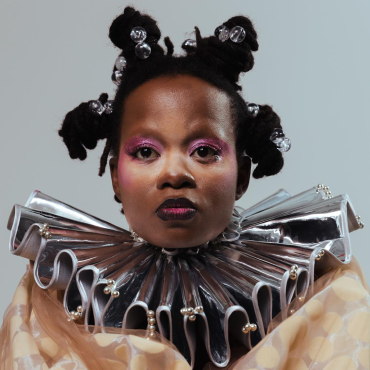

Ella Josephine Julia (Cleo) Moore is a multi-disciplinary artist whose practice uses participatory art, music composition, instrument-making, bandleading, installation, and fabric arts. Under the alias Cleo Reed, they complete musical projects that are rooted in their ancestral and cultural lineage. Their debut album project, Root Cause was released in 2023 and alongside the work they premiered a self-directed performance art piece titled Black American Circus at AFROPUNK Festival, Banlieues Bleues in Paris, and Brooklyn Museum. Reed is a recipient of the 2024 Map Fund. Reed is currently a resident at Abrons Arts Center’s AIRspace Performance Residency through 2026, and a 2025 Session Resident for Recess Arts. Recently, they developed software instruments for Jon Batiste’s American Symphony at Carnegie Hall.
Fellowship Statement
Whether underground or academic, experimental or popular, I am drawn to question the notion of tradition, to dissolve the binary, make noise, and push the barrier between artist and audience. My goal is to catalyze conversation and challenge notions of tradition and identity, dissolving the barriers between artists and audience. During the Jerome Hill Artist Fellowship, I intend to create work focused on expanding musical works into more multidisciplinary and socially-engaged projects. I work toward a future that enables me to realize intentional creative endeavors and encourage joy within collaborative spaces such as museums, theaters, and unseen spaces.
Photo by Geoffrey Baptiste.
Technology Centered Arts
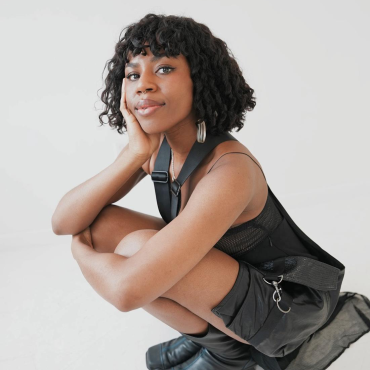

Zainab “Zai” Aliyu is a Nigerian-American artist, designer, and cultural worker living in Lenapehoking (Brooklyn, NY). Her work explores the cybernetic and temporal entanglements within societal dynamics. She aims to understand how all sociotechnological systems of control are interconnected, and how we are all materially implicated through time. Aliyu is a 2023-24 NYSCA/NYFA Artist Fellow and former co-director of the School for Poetic Computation. Her work has been presented internationally at Gardiner Museum (Toronto, Canada), Vienna Design Week (Vienna, Austria), Film at Lincoln Center (New York, NY), Smack Mellon (Brooklyn, NY), Museum of Modern Art (New York, NY), Miller ICA (Pittsburgh, PA), Centre for Heritage, and Arts and Textile (Hong Kong, China), among others. She has been awarded residencies at MASS MoCA (North Adams, MA), Haystack Mountain School of Crafts (Deer Isle, ME), The Luminary (St. Louis, MI), Casa do Povo (São Paulo, Brazil), and Pocoapoco (Oaxaca, Mexico), among others.
Fellowship Statement
I draw upon my body as a corporeal archive and site of ancestral memory to craft counter-narratives through sculptures, videos, installations, virtual environments, publications, archives, and social practice. Grounded in antiracist, decolonial, and feminist critiques of technology, my work situates personal, familial, and ancestral histories within broader sociopolitical frameworks. During the fellowship, I plan to research, conceptualize and build new works that experiment with sculptural and digital media, with an aim to expand the narrative possibilities of my practice.
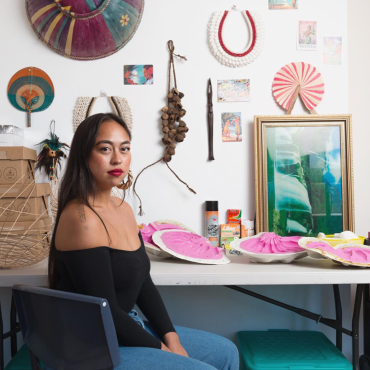

Caroline Garcia is a transpacific, interdisciplinary artist based in Brooklyn, New York. She works across performance, moving image, and installation through a hybridized aesthetic of cross-cultural movement, embodied research, and new media. Her practice weaves together ethnotraditional forms of knowledge including botany, poetry, dance, and ceramics with digital technologies such as green screening, robotics, motion capture, extended realities (AR/VR), and 3D processes. Garcia is a NYSCA/NYFA Artist Fellow: Digital/Electronic Arts, New York Artadia Awardee, Franklin Furnace Fund recipient, and the American Australian Association’s AUSART Fellow. She has presented work at The SHED, Lincoln Center, Creative Time Summit X and HQ, Museum of Contemporary Art Australia, Sydney Opera House, Manila Biennale, among others. Caroline is currently an A.I.R. Gallery Fellow and was formerly in residence at the EMPAC, MASS MoCA, ISCP, Pioneer Works, Recess, Alfred IEA, and LMCC’s Workspace program.
Fellowship Statement
My artistic research inquiries create unique constellations that intersect the past, present, and future. Using found footage, archives, and artifacts, I digitally sample popular culture and colonial imagery to critically re-appropriate problematic narratives of cultural representation. I am committed to centering Indigenous protocol and addressing diasporic ontologies and its privileges. I experiment with new media in order to outmaneuver forces of oppression. I utilize digital technologies as tools to transmit gestures and rituals into disembodied landscapes. I welcome the transgressive potency of rage and refusal to render critical awareness for communities confronting the status quo in politics, culture, history, and other areas of life. By initiating my own recuperation of violence, I (co)generate gateways for both the self and collective to engage with systemic themes of identity, immigration, and safety.
Photo by Alex Wisser.
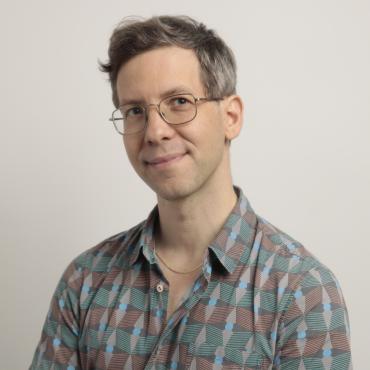

Or Zubalsky is an artist exploring overlaps between trauma, memory, transformation, and healing. They were previously a resident at Pioneer Works (2023), NEW INC incubator member (2023), and C/Change R&D Lab fellow (2023). Zubalsky’s work has been supported by The New Museum, The Museum of Art and Design, Queens Museum of Art, Rhizome, Eyebeam, Culture Push, Brooklyn Arts Council, and Art Matters, among others. They been developing a trauma-informed approach to making and relating to art through practicing, teaching, peer learning, and organizing. They have made video, performance, and software-based work that unpacks how memory operates, specifically in relation to settler colonialism. Since becoming a parent, Zubalsky has been exploring the inner workings of memory in relation to post-trauma and gender. They live in Lenapehoking (Brooklyn) with their partner and child.
Fellowship Statement
The main subject in my work is the gap in fragmented post-traumatic memory. It is a space of absence and disconnection as well as an opening through which resonance can be felt. In the past years, I made work that recognized the existence of the gap and explored some of its characteristics. Now, I am ready to make work from within it. My experience of post-trauma is such that the mysterious operations of memory can be both terrifying and precious. To aspire to make work from within the gap is to seek an opportunity to channel lightness and ease in response to oppression and harm. Having the support to sustain my practice for three years will help me grow into this work. This support will allow me to move at the rhythms that my body will allow, develop a new visual vocabulary, and document the beauty in the interwoven processes of healing and transition.
Photo by Levi Mandel.
Theater, Performance, and Spoken Word
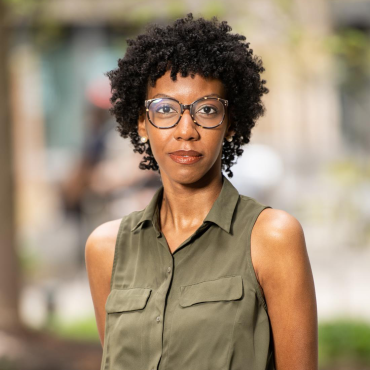

Calley N. Anderson (she/her) is a Brooklyn-based playwright from Memphis, TN. Her work has been staged at several colleges and 10-minute play festivals around the country, including commissions by the Davidson College Theatre Department and the University of Memphis Department of Theatre and Dance. Anderson is currently a National Black Theatre I AM SOUL Resident Playwright. Her work has been supported by Page 73, SPACE on Ryder Farm/RE Endeavors, American Theatre Group PlayLab, Downtown Urban Arts Festival, MacDowell, Liberation Theatre Company, Clubbed Thumb, The Civilians, and the Dramatist Guild Foundation. Anderson holds an MFA from New School for Drama and a BA from Davidson College.
Fellowship Statement
Almost everything I do (personally, professionally, and artistically) is inspired by, in service of, and/or a reflection of Southern Black folks. My Memphian-ness is the heartbeat of my work. Even if a particular play is not set in Memphis or the South, both are woven into the work—alive and pulsing in the background because it is my frame of reference for being in this world. I believe it creates an on-ramp for other Southern Black folks: to fully see themselves as the critical part of someone’s journey, the main and supporting characters on someone’s stage, and the audience, whose opinion matters most to at least one person in the world. Like many before me, I hope to use my work not just to build new narratives for Southerners to hold, but also for those beyond our Mason-Dixon to witness, engage with, and take seriously.
Photo by Nathaniel Johnston.
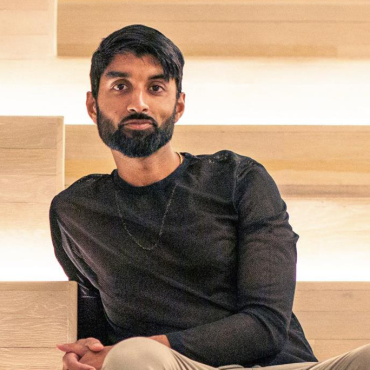

Anooj Bhandari is an artist creating experimental performance and theater. He believes deeply in art as a process to ask quiet questions publicly. He is an alumnus of EmergeNYC, the Hemispheric Institute’s Fellowship for Emerging Political Performance Artists, the Lighthouse Residency at the BEAM Center, and The Bandung Residency with the Asian American Arts Alliance and the Museum of Contemporary African Diasporic Arts. Bhandari is a 2023 MacDowell Fellowship recipient in the Theater Arts. He is also an ensemble member of the New York Neo-Futurists, where he writes, performs, and directs in their weekly show, The Infinite Wrench.
Fellowship Statement
During the Fellowship, I intend to expand on a larger body of work titled A Geometric Proof for Changing the Shape of a Dollar, exploring the intersections between grief, migration, and spirit through the counterfeit dollar. The work will utilize puppetry and multi-media installation to weave together narratives of global end-of-life ritual, mutualism within nature, and histories of geometric tiling, to explore two central questions of counterfeit practice: How will we replicate the shapes we make? And where does the impact of our work begin? I also intend to develop an immersive, mobile puppetry unit that will build site-specific performance around New York City in the aesthetics of a mystical chai stall. I am interested in creating art that extends the future of theater as a significant cultural tool, rather than a future of the “great American theater.”
Photo by Chan Lin.
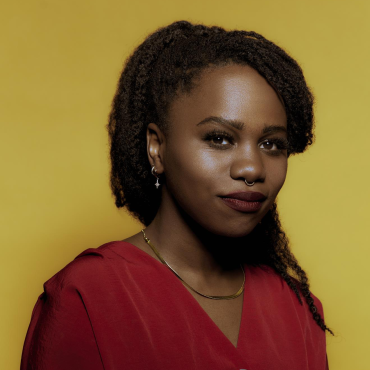

Zola Dee is a playwright, screenwriter, and performer whose works are deeply invested in exploring Black Americana, African diasporic religions, and imagining freer worlds for the Black collective body. Her plays include GUNSHOT MEDLEY, Smile, Goddamnit, and Father, Father. Other accomplishments include: 2023 I Am Soul National Black Theater Resident Playwright, Playwrights’ Center Jerome Fellow 2022-2023, Playwrights’ Center Many Voices Fellow 2021-2022, Center Theatre Group Writer’s Workshop 2019-2020. Dee is a graduate from California Institute of the Arts with a BFA in acting and a minor in creative writing. She is currently represented by WME and Management 360.
Fellowship Statement
I am currently developing a trilogy of plays set in the South Carolina Lowcountry, exploring the journey of a Black family from Reconstruction to the present day. The story centers a young girl named Presence who witnesses her mother's, already fragile mental health deteriorate after her grandmother dies and the family home is sold. Presence embarks on a literal journey through her family's past. She's determined to unearth the roots of the "sadness" that has plagued this family for generations and put an end to its cycle. This project is deeply intertwined with field research within the Gullah Geechee community. The Fellowship will provide invaluable support in continuing this research and expanding it to Bahia, Brazil, for a different set of plays I am developing. By connecting these narratives across port cities like Salvador and Charleston—spanning continents and time—I aim to showcase not only the resilience and complexities of the diaspora, but also our ever-enduring joy.
Photo by Canaan Mattson.
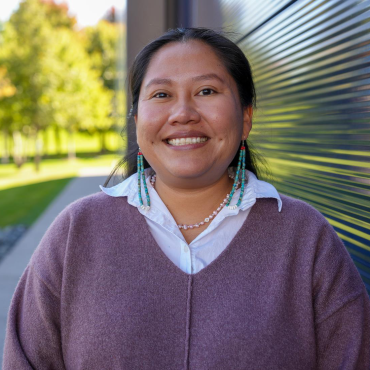

Blossom Johnson is a Diné playwright, dramaturg, and screenwriter. She is Yé'ii Dine'é Táchii'nii, and her maternal grandfather is Deeshchíí'nii. She was awarded a residency with Willowtail Springs in 2021, 2022, and 2023. Additionally, she has been awarded AlterTheater Ensemble's AlterLab 2020-21, the 2022 First Peoples Fund Cultural Capital Fellowship, 2022 Netflix Animation Foundations Program Mentee, La Lengua/ AlterTheater Ensemble's Decolonization Stories Commission 2022, The Playwrights' Center 2022-2023 Jerome Fellowship, and the Minnesota State Arts Board Creative Support for Individuals for the 2023 and 2024 fiscal year. Her play, Diné Nishłį (i am a sacred being), Or A Boarding School Play, made the Kilroys 2023 Web list, and had a World Premiere with Bag&Baggage Productions and Native Theater Project. Johnson holds an MFA in Dramaturgy from Columbia University and a BA in Theatre from Arizona State University.
Fellowship Statement
I am honored to be a 2025 Jerome Hill Artist Fellow, and I am excited to continue to serve my community as a storyteller. During my Fellowship I will conduct research, learn, and continue to write a new play and musical that centers Diné experiences. I want to strengthen my community by leaning into my culture, history and language. By doing this I can disrupt the dominant American Theatrical narrative that often does not highlight, engage and empower Native people and their stories. This little rez girl is full of joy, hope and possibilities. Axhéhéé (Thank you)!!
Photo by Joshua Cummins.
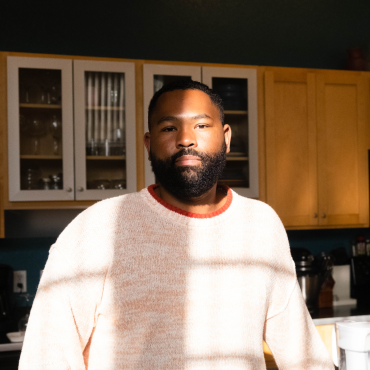

JuCoby Johnson (he/him) is a New York-based playwright, actor, and screenwriter originally from Jacksonville, FL. His plays include How It's Gon Be (Echo Theater, 2023; Underdog Theater, 2019), ...but you could've held my hand (CATCO, 2022; O'Neill NPC Summer Season, 2022), 5 (Jungle Theater, 2023; O'Neill NPC Summer Season, 2022; Seven Devils Finalist), Heritage (International Black Theater Festival, 2024); I'll Be Seeing You Again (Jungle Serial Audio Series, 2021) and Revelations (Playing On Air, 2021). He is the recipient of the 2020 McKnight Fellowship, was a member of the 2022 Sony Pictures Television Diverse Writers Program, and a member of the inaugural Artist Cohort at The Jungle Theater. Johnson has been seen onstage at The Guthrie Theater, Cincinnati Playhouse in the Park, The Jungle Theater, Theater Latté Da, Theater Mu, Ten Thousand Things Theatre Company, and many more. He is currently participating in The Juilliard School’s Lila Acheson Wallace Playwrights Program.
Fellowship Statement
I write poetic, lyrical, magical love stories centered around Black people and Black communities. I try to conjure the people I grew up with, people who never imagined they would see themselves in a play, and make their existence as beautiful, as epic, and as complex as any piece of Shakespeare or Greek literature. I'm particularly fascinated by complicated relationships and by the struggle to figure out how to love each other better. My greatest dream is that a young Black person sees my work and feels seen, heard, and less alone in the world.
Photo by Isabel Fajardo.
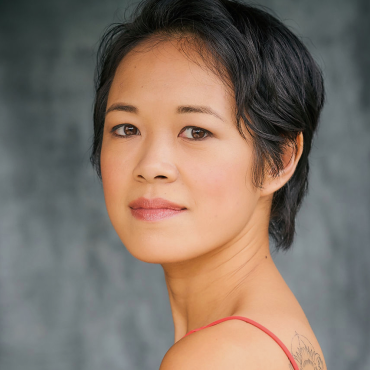

Nancy Ma is a first-generation performer, playwright, and filmmaker from Chinatown, New York City. Her solo show, Home, premiered with The Latino Theater Company in Los Angeles, and has been performed at schools and festivals around the country. She has worked with Pan Asian Repertory Theater, Ojai Playwrights, and UTR/The Public, and been awarded residencies with The National Arts Club, The New Harmony Project, The Museum of Chinese in America, and Fresh Ground Pepper. Most recently, her short documentary 有一天你不在 One Day You are Not Here, wrapped the festival circuit. Ma is also the co-founder of Max2 Film Festival, a two-minute film festival focused on experimentation and community. She has taught with The Brooklyn Arts Council, Young Storytellers and Built4Collapse, and currently facilitates storytelling workshops with The Moth.
Fellowship Statement
My work is inspired by my identity as a first generation Asian American woman who was raised in a working class immigrant environment. This means processing a lot of buried feelings, doing the most to prove being female is enough, and laughing and crying loud enough to make up for the silence and survival in my family. I explore what home feels like, and that often means I revisit painful and unprocessed memories of people and places. I am currently working on Sweatshop Melody, a musical that follows a group of immigrant women who work at a garment factory; and This Body was Made for Bleeding, an experimental multimedia multilingual theater piece about the blessings and burdens of the female body. I aspire to make spaces that facilitate collective healing and difficult conversations.
Photo by Peter Konerko.


Oanh Vu (she/her) is a puppeteer, educator, and community organizer. As a second-generation Vietnamese American, she employs humor and the playful art of puppetry to weave narratives centered on healing and social change for her communities. Her latest puppet show, Phantom Loss, follows a cast of multi-generational Vietnamese characters as they navigate the legacies of war and what healing can look like in the wake of historical violence. Oanh has been recognized with grants from the Jim Henson Foundation in 2023 and 2024. She began her puppetry journey with Monkeybear’s Harmolodic Workshop and served as a 2024 Maker Series Artist in Residence at Pillsbury House Theatre. Her work has reached audiences at various venues across the Twin Cities, including In the Heart of the Beast Theatre, Minnesota Opera, the Minneapolis Institute of Art (Mia), the Playwrights' Center, and Theater Mu.
Fellowship Statement
I hope to use this Fellowship to support the creation of my next puppet show, which will delve into the impacts of labor and capitalism on Asian Americans, whose value is often measured by their productivity. These damaging perceptions contribute to wage inequality and lead to issues such as overextension and burnout.
Additionally, I am excited about using this Fellowship to better balance my role as an artist with my work as an educator, and community organizer. I wrestle with how to effect tangible changes in people's material conditions. This is a question I am actively exploring and look forward to unpacking further. I find that narrative is a powerful tool to shape our understanding of the world and thus a way to create political change. The puppetry field in America is sorely lacking BIPOC artists, so many of our stories are missing from this artform, despite puppetry having historical global roots. As a Vietnamese American I want to continue creating shows that are unapologetically Vietnamese but generally accessible to non-Vietnamese people.
Photo by Ryan Stopera.
Visual Arts
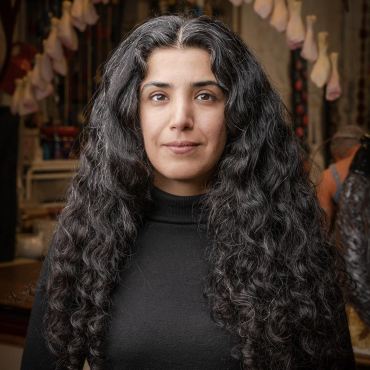

Katayoun Amjadi is an Iranian-born, Minneapolis-based artist, educator, and curator. Her work considers the sociopolitical systems that shape our perceptions of self and other, such as language, religion, gender, politics, and nationalist ideologies. Her art probes relationships: between past and present, tradition and modernity, and individual versus collective identity. Her work simultaneously seeks to spur discussion about our place in the temporal arc and the interwoven roots of our histories. Amjadi holds an MFA in ceramics and sculpture from the University of Minnesota Twin Cities. Her work has been exhibited at Minnesota Museum of American Art, Weisman Art Museum, South Dakota Museum of Art, Des Moines Art Center, Beijing Film Academy, and Karlsruhe Academy of Fine Arts among others. Selected awards include MCAD-Jerome Emerging Artist (2020/2021), Artist Initiative Grants (2015/2019), and Creative Individual Grant (2024) from the Minnesota State Arts Board.
Fellowship Statement
My work is essentially a form of social practice based in ceramic objects and installations, with an emphasis on aesthetic clarity and public engagement. Colloquially I am the village potter, the storyteller. I want the stories I tell to resonate, illuminate, inspire or provoke: to cause one to think deeply, see differently, to feel passionately.
I have always been intrigued with the fluidity of ceramics moving between art and craft, the sacred and profane. My work is in constant dialogue within this realm, exploring curios and collectibles, the lost artifact, or forgotten story, consumable goods and souvenirs. I seek to carry the many references of their original voice, and to develop a grammar of objects; to discover the narrative threads that bind local to global, personal to universal. The question always remains: how do I develop a language, and thus tell a story through gathered artifacts?
Photo by Sarah Sampedro.
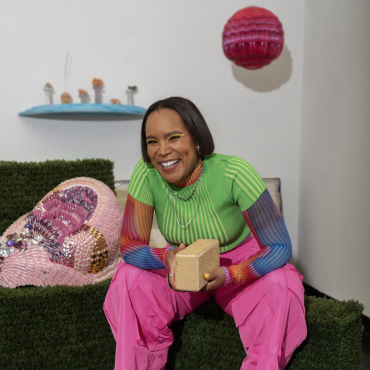

Pamela Council is an interdisciplinary artist creating works of veneration and playful catharsis. These multi-sensory dedications to the unsung, including their series Fountains for Black Joy, meticulously process history using dark humor, bright colors, nostalgic smells, and a campy Afro Americana aesthetic. They have created commissions for The Studio Museum in Harlem and VOLTA NY and exhibited at the Aldrich Art Museum, New-York Historical Society, and The New Museum for Contemporary Art. Council has been awarded numerous residencies including MacDowell Colony and ISCP. Council is an alumnus of Columbia University (MFA), and Williams College (BA), which awarded them the 2022 Bicentennial Medal as a distinguished alumna. They are a recipient of the 2017 Joan Mitchell Painters & Sculptors Grant and a 2023 Guggenheim Fellowship.
Fellowship Statement
During my Fellowship, I will continue to create works ranging in scale from miniature to monumental, designing playful art that engages architectural history and supports public and private catharsis. I envision the Fellowship duration as a time when I can both get organized and feel free to experiment, tell stories that may not be the most commercially viable, and build a team to support my vision. I want people to meet at my fountains for reflection, sit on my benches and share gossip, and enjoy interiors filled with freedom-inspiring objects.
Photo by ally caple (@allycaple on Instagram), courtesy Pamela Council.
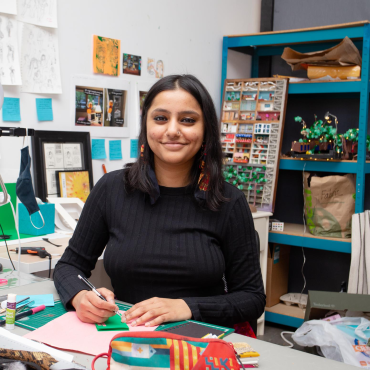

Roshan Ganu is a multimedia artist originally from Goa-India, currently based in Minneapolis. She works at the intersection of moving image collage, projection, and non-linear notions of space and time. Ganu is an awardee of the Minnesota Artists Exhibition Program (MAEP) by the Minneapolis Institute of Art for her exhibition titled रातराणी: The Night Blooming Jasmine. She received the MCAD-Jerome Early Career Award in 2022 and was an artist in residence at Out of the Circle residency in Cairo, Egypt in 2023. Her work has been exhibited nationally and internationally, including at Medrar For Contemporary Art in Cairo- Egypt, MdW Art Fair in Chicago, Rochester Art Center, and Soo Visual Art Center in Minnesota, among others. Publications such as Brooklyn Rail, Star Tribune, Minnpost, MNArtists-Walker Art Center, and Minnesota Public Radio have written about her work with features, articles, and interviews. Ganu currently teaches at the Minneapolis College of Art and Design and at Hamline University.
Fellowship Statement
During the Fellowship, I intend to use the video medium to explore a familiar place: the Konkan region which lies along the west coast of India. This is where I grew up, as did the past few generations of my family. As a foreigner in Minneapolis and a local in the Konkan belt, I am curious about the aesthetic that will emerge from this relationship. My work plays with narrative in visual layers that reappear from one body of work to another. I am pursuing an archive of this unique visual vocabulary via the myriad languages and places that build my identity, especially the Marathi language. As a moving image artist, my transdisciplinary installations invoke each aspect of our consciousness: the sensorial, emotional, physical, spiritual, the awake, as well as the sleeping. An immersive space activates this multi-modal engagement, wherein intricately layered video, narrative, sound, color, light, and texture makes the work accessible to a broad spectrum of audiences.
Photo by Roshan Ganu.
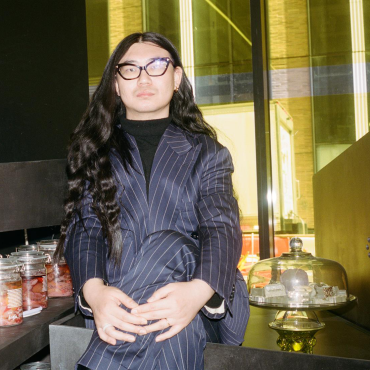

Mo Kong is an interdisciplinary artist and researcher currently residing in NYC. Their work usually takes the form of large-scale installations involving scientific research and multiple journalistic perspectives. Kong challenges key issues of the day using complex narratives that bring together the past and the present. They have had solo exhibitions at Queens Museum, Smack Mellon, CUE Art Foundation, Cuchifritos Gallery, Artericambi Gallery (Verona), and Gertrude Gallery. They also received fellowships and residencies from Sharpe Walentas, Macdowell Colony, Skowhegan, Triangle Art Association, The Drawing Center, City Artists Crops Grant, Mass MoCA Studio, Vermont Studio Center, Lighthouse Works, and Artists Alliance LES Studio Program. Kong’s work has been written about in Hyperallergic, Artforum, Art in America, Cultured magazine, Artnet, Bomb magazine, Artpapers, CoBo Social, Wall Street International, SFMoMA Public Knowledge, and more. They received an MFA from the Rhode Island School of Design.
Fellowship Statement
My work reflects my long-standing interest in the natural sciences, uses a self-research process, and accounts for our position in complex historical and social events. The focus of my work revolves around "Slowbalization"—the opposite of globalization—which is characterized by xenophobia, economic isolation, and environmental collapse. The work explores the effects of these phenomena on the daily life of immigrants. I plan to continue working on my current series called Personal Ark®, which envisions this Asian immigrant-owned survival company and showcases the brand's apocalypse survival technology through site-specific installations. The series combines historical research, architecture, performance, cutting-edge technology, and biomaterials to reimagine Asian futurism and Asian pessimism. Through the lens of technological orientalism and olfactory orientalism, my works aims to help the Asian diaspora to navigate and survive the apocalypse.
Photo by Justin Baez.
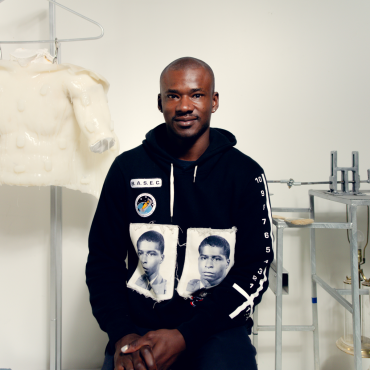

Jeffrey Meris (b. 1991, Haiti, raised in the Bahamas) is a multidisciplinary artist whose practice engages with the relationship between materiality and larger cultural and social phenomena. He has exhibited at François Ghebaly, Los Angeles (2025); Williams College Museum of Art, Massachusetts (2024); MoMA PS1, New York (2023); Amon Carter Museum, Texas (2023); Lehmann Maupin, New York (2022); White Columns, New York (2021); and the National Art Gallery of the Bahamas,and Mestre Projects, in Nassau, Bahamas (2012, 2021). Meris is a Skowhegan School of Painting and Sculpture alum (2019); a NXTHVN Studio Fellow, New Haven (2020); and a Studio Museum in Harlem A.I.R 2022-2023. Always Jeffrey never “Jeff.” He earned his AA in arts and crafts from the University of the Bahamas in 2012, a BFA in sculpture from the Tyler School of Art in 2015, and an MFA in visual arts from Columbia University in 2019.
Fellowship Statement
In my practice, I oscillate between the embodied trauma of the colonial project in my kinetic sculptures to utilizing restorative strategies in my sculptures, paintings, and installations. What would healing centuries of xenophobia, queerphobia, and other oppressive systems look like? My destiny is in search of sanctuary; I believe that the future is Black. I use symbols of trauma and transform them into beacons of hope and prosperity. During the Fellowship, I plan to advance my studio practice and create more sustainable structures for my practice.
Photo by Will Pippin, Cultured Mag.


Asif Mian uses video, installation, performance, and sculpture to investigate the tenuous connections between the events that shape one’s life. He has held solo exhibitions at Management and Crush Curatorial in New York City and Fjord Gallery in Philadelphia, and has participated in group exhibitions at Okayama Art Summit, the Whitney ISP, The Shed, Queens Museum, and BRIC, among others. Mian is a Rema Hort Mann Foundation Emerging Artist awardee and has been featured in ArtForum, Artnet, Art Observer, and The Dallas News. He was awarded the Queens Museum-Jerome Foundation Fellowship, where his multi-chapter project, RAF, was the focus of a 2021 solo exhibition. His work breaks down and rearranges mediums to evoke a liminal psychological space, where the “ghosts” of events and the mental processing of violence reside. He graduated from Drew University with a BA Biology and BA Studio Art; earned an MFA Visual Arts from Columbia University; and is a Skowhegan alum.
Fellowship Statement
In my multichapter RAF project, I am drawing from personal and familial experiences of violent crime, alongside structures of criminality and policing, to articulate how these forces have shaped facets of American culture. I am developing a video work, Qareen, that will combine forensic documentary, character performance, and thermal infrared videography. I am also developing sand sculptures and wall reliefs by ‘possessing’ sand through catalytic and bonding techniques. Sand can flow like water, solidify like stone, melt into glass, and alchemize into mirror. Its sensorial traits are essential in engaging conscious and subconscious explorations of emotional processing. By merging classic art therapy methods with my own practice of experimental sculpture and performance, I would like to explore how the effects of violence, trauma, and therapy can be reinterpreted through innovative art practices.
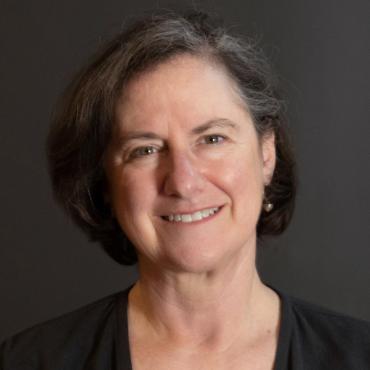

Amy Usdin weaves onto worn nets, sculpting work that speaks to loss, longing, and the dissonance of nostalgia. With a BFA in Graphic Communications from Washington University, St. Louis, she began her current practice in 2018. She has exhibited throughout the United States and in Australia in surveys representing the diversity and breadth of contemporary craft and fiber art. In 2025, she will open solo shows at Lawton Gallery in Green Bay, WI and the Appalachian Center for Craft in Smithville, TN. Usdin has held residencies with Hafnarfjörður Centre of Culture and Fine Art, Haystack Mountain School of Crafts, the Miller Art Museum, and Praxis Fiber Workshop. She has received past support from the Minnesota State Arts Board and the Metropolitan Regional Arts Council. Usdin is a 2024 Stone and DeGuire Contemporary Art Award recipient and a 2024/25 MCAD–Jerome Foundation Fellow.
Fellowship Statement
I needle-weave abstract physical and psychological landscapes onto aging fiber artifacts—most often fly nets for horses and fishing nets. As I recontextualize these materials of trade into critical and aesthetic space, the transformation creates new narratives that honor the revolving intersections of past and present. The ragged nets act as empathic objects, offering a point of connection and shared humanity. I am increasingly interested in the correlation between bodies of land and water and bodies of flesh and blood—the trauma they endure, what is inevitable versus imposed; weaving fills a need to document these scars aesthetically. Throughout the Fellowship years, this slight conceptual shift will find expression through net sculptures as well as loom-woven work that sits in conversation with them.
